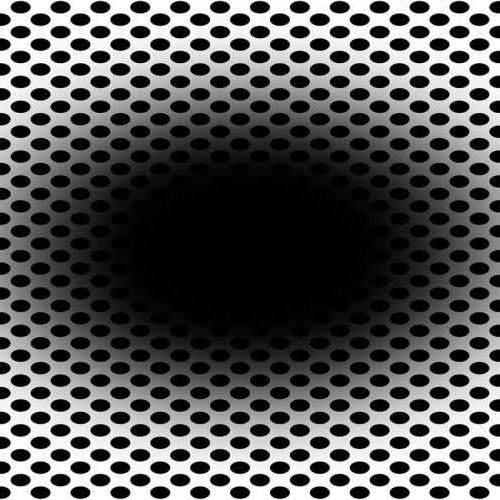
| Added | Wed, 01/06/2022 |
| Источники | |
| Дата публикации | Wed, 01/06/2022
|
| Версии |
A new optical illusion may fool most of us into perceiving an expanding black hole, a new study reports.
The image is completely static, but, according to the researchers, it causes people "a growing sense of darkness, as if they are entering a space devoid of light."
Illusory forward movement is probably our mind's way of preparing us for a change of scenery. By predicting the transition from brightness to darkness, our visual system can adapt much faster to potentially dangerous conditions, the researchers suggest.
"Just as glare can blind, plunging into darkness is probably risky when navigating in a darkened environment," the authors write in their new paper.
"Although, as in any illusion, this virtual expanding darkness is experienced at the cost of certainty, since the observer does not move forward and does not enter the dark space, such a price is likely to be less serious than in the absence of correction, when the observer really moves forward into the dark space."
In the first study devoted to the analysis of this optical illusion, we studied how the color of the hole and surrounding points affects our mental and physiological response.
To do this, a group of 50 participants with normal vision were presented with images of an "expanding hole" of various colors on the screen. In the series, they were also shown scrambled versions of the illusion with no discernible pattern of light or color.
The illusion of moving forward was most effective when the hole was black. When the hole was this shade, 86 percent of the participants had a feeling that the darkness was moving in their direction.
Tracking the participants' eye movements showed that their pupils unconsciously dilated at the sight of a black hole.
At the same time, if the hole was white, their pupils narrowed only slightly.
"Here we have shown, based on the new illusion of an "expanding hole", that the pupil reacts to how we perceive light - even if this "light" is imaginary, as in the illusion - and not only to the amount of light energy that actually enters the eye," says psychologist Bruno Laeng from the University of Oslo in Norway.
"The illusion of an expanding orifice causes a corresponding dilation of the pupil, as it would happen if the darkness really increased."
The authors are not sure why 14 percent of the group did not perceive any illusory expansion when the hole was black. But even among those who perceived the illusion, the intensity of sensations was different.
The people who felt the illusion the most were also the ones whose pupil diameter changed the most.
"Our results show that the pupil dilation or constriction reflex is not a closed mechanism, like a photocell opening a door, immune to any other information other than the actual amount of light stimulating the photoreceptor," says Laeng.
"Rather, the eye is attuned to perceived and even imagined light, rather than just physical energy."
The authors have a hypothesis why the eye can do this. When the central area is black, our pupils are probably preparing us for a brightness change in the near future.
Instead of seeing the information that is presented directly in front of us, the visual neural network predicts how this information will change in the future, creating an "illusory" external expansion of the "central region of the hole".
If the brain didn't do this, it would take milliseconds longer for the new visual information to reach higher processes in the brain. If it took so long to dilate the pupils, we would not be able to navigate in the dark so effectively.
Now the authors want to check whether illusions deceive other animals in order to better understand how the human visual system developed.
The study was published in the journal Frontiers in Human Neuroscience.
Log in or register to post comments

